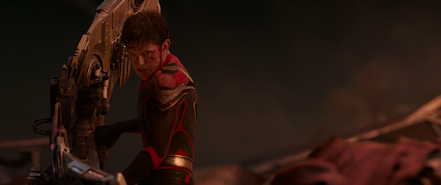Heavily indebted to Bob Persichetti, Peter Ramsey and Rodney Rothman's excellent Spider-Man: Into the Spider-Verse, Jon Watt's multi-dimensional pile-up, Spider-Man: No Way Home, employs the same reality-bending as its animated predecessor - not to mention the current Marvel streaming shows - to give this increasingly disconnected sub-series (as well as long-time executive producer Avi Arad) a victory lap. In doing so, No Way Home batters Tom Holland's likeable take on Peter Parker out of his moneyed comfort zone to re-establish a balancing act minted in a previous Spidey phase. The film abandons the overloaded technological wish-fulfilment - that saw Spider-Man subordinated into the role of Iron Man's teenage ward - to push at the working class ache that underpinned Sam Raimi's take on the character. No Way Home drags in adversaries from these Raimi films, as well as the two Marc Webb instalments that followed, as a way to brute force Holland's Parker through this conceptual shake-up.
No Way Home is a piecemeal experience. Strange highlights - imported from different films and deployed to wrinkle recognition - struggle to exert themselves on a whole that seems to be either thrashing around in the midst of an onscreen identity crisis or simply holding the Spider-Man character to ransom ahead of the next round of financier negotiations. Willem Dafoe's Green Goblin is an obvious but under-explored delight though. The character's trajectory built around the tensions of a personality split that, unfortunately, we barely see overlap. Still, even if No Way Home doesn't apportion enough screentime to Osborn to manufacture a believable (or even trackable) sense of mounting disquiet, the film does remember that the action in the first Spider-Man's was defined by a deeply personal strain of violence. While the weight that Watts and his screenwriters (Chris McKenna and Erik Sommers) heap on their hero never comes close to matching the face-swelling welts that Raimi dished out, Holland does get to play murderous rage: punch after punch, hammering down on the teeth of a clearly ecstatic Goblin. For a series of films in which (comfortably) billions of people have died, the motivational power of pure hatred is a note that has been largely absent.


I've been refreshing the site for this, no joke. Worth the wait, as always.
ReplyDelete